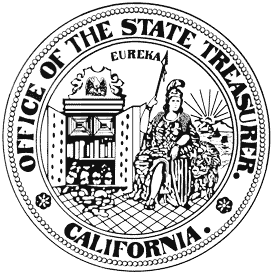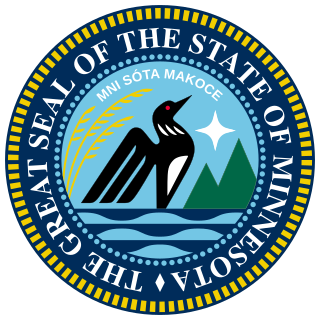
The state controller of California is a constitutional office in the executive branch of the government of the U.S. state of California. Thirty-three individuals have held the office of state controller since statehood. The incumbent is Malia Cohen, a Democrat. The state controller's main office is located at 300 Capitol Mall in Sacramento.

The state auditor of North Carolina is a statewide elected office in the U.S. state of North Carolina. The state auditor is a constitutional officer responsible for overseeing and reviewing the financial accounts of all state government agencies. The auditor also conducts performance audits of state agencies, ensures state agencies' accounting conforms with Generally Accepted Accounting Principles, evaluates the integrity of computer-generated information, and investigates the misuse of state funds or property. The incumbent is Jessica Holmes, who became state auditor on December 16, 2023.

The state treasurer of California is a constitutional officer in the executive branch of the government of the U.S. state of California. Thirty-five individuals have held the office of state treasurer since statehood. The incumbent is Fiona Ma, a Democrat. The state treasurer's main office is located in the Jesse M. Unruh State Office Building in Sacramento.

The secretary of state is an official in the state governments of 47 of the 50 states of the United States, as well as Puerto Rico and other U.S. possessions. In Massachusetts, Pennsylvania, and Virginia, this official is called the secretary of the commonwealth. In states that have one, the secretary of state is the chief administrative officer of the state and is often the primary custodian of important state records. In the states of Alaska, Hawaii, and Utah, there is no secretary of state; in those states many duties that a secretary of state might normally execute fall within the domain of the lieutenant governor. Like the lieutenant governor, in most states, the secretary of state is in the line of succession to succeed the governor, in most cases immediately behind the lieutenant governor. In three states with no lieutenant governor as well as the U.S. territory of Puerto Rico, the secretary of state is first in the line of succession in the event of a gubernatorial vacancy.

The state auditor of Minnesota is a constitutional officer in the executive branch of the U.S. state of Minnesota. Nineteen individuals have held the office of state auditor since statehood. The incumbent is Julie Blaha, a DFLer.

The State Treasurer of Oklahoma is the chief custodian of Oklahoma's cash deposits, monies from bond sales, and other securities and collateral and directs the investments of those assets. The treasurer provides for the safe and efficient operation of state government through effective banking, investment, and cash management. The state treasurer has the powers of a typical chief financial officer for a corporation.

The state treasurer of Minnesota was a constitutional officer in the executive branch of the U.S. state of Minnesota. Twenty-six individuals occupied the office of state treasurer from 1858 until the office's abolition in 2003. The final state treasurer was Carol C. Johnson, a DFLer.

The state auditor of Missouri is an elected constitutional officer in the executive branch of government of the U.S. state of Missouri. Thirty-eight individuals have occupied the office of state auditor since statehood. The incumbent is Scott Fitzpatrick, a Republican.

The New York state comptroller is an elected constitutional officer of the U.S. state of New York and head of the New York state government's Department of Audit and Control. Sixty-one individuals have held the office of State Comptroller since statehood. The incumbent is Thomas DiNapoli, a Democrat.

The California Department of Finance is a state cabinet-level agency within the government of California. The Department of Finance is responsible for preparing, explaining, and administering the state's annual financial plan, which the governor of California is required under the Constitution of California to present by January 10 of each year to the general public. The Department of Finance's other duties include analyzing the budgets of proposed laws in the California State Legislature, creating and monitoring current and future economic forecasts of the state, estimating population demographics and enrollment projections, and maintaining the state's accounting and financial reporting systems.

State auditors are fiscal officers lodged in the executive or legislative branches of U.S. state governments who serve as external auditors, program evaluators, financial controllers, bookkeepers, or inspectors general of public funds. The office of state auditor may be a creature of the state constitution or one created by statutory law.

The Nevada state treasurer is an independent constitutional officer in the executive branch of government of the U.S. state of Nevada. The State Treasurer's Office is based in Carson City, Nevada. Twenty-three individuals have occupied the office of treasurer since statehood. The incumbent is Zach Conine, a Democrat. He was first elected in the 2018 election and is currently serving his second term in office.

The Comptroller of Illinois is a constitutional officer in the executive branch of government of the U.S. state of Illinois. Ten individuals have held the office of Comptroller since the enactment of the Illinois Constitution of 1970, replacing the prior office of Auditor of Public Accounts that was first created in 1799. The incumbent is Susana Mendoza, a Democrat.

The Victim Compensation Board (CalVCB) is a state agency of the U.S. state of California that oversees the provision of compensation to victims of violent crime and the collection of restitution from criminal offenders. CalVCB is part of the California Government Operations Agency (CalGovOps). The board consists of three members: the Secretary of CalGovOps, who serves as the chair; the California State Controller; and a member appointed by the Governor, currently vacant.
The state controller of Idaho is a constitutional officer in the executive branch of government of the U.S. state of Idaho. Twenty-one individuals have held the office of state controller or its predecessor office of state auditor since statehood. The incumbent is Brandon Woolf, a Republican.
The statutory and fiduciary mandate of the State Board of Administration of Florida (SBA) is to invest, manage and safeguard assets of the Florida Retirement System (FRS) Trust Fund as well as the assets of a variety of other funds. The SBA manages 25 different investment funds and trust clients.

The Washington state treasurer is an elected constitutional officer in the executive branch of the U.S. state of Washington. Twenty-two individuals have held the office since statehood. The incumbent is Mike Pellicciotti, a Democrat who began his term in January 2021. The treasurer's office is located in the Washington State Capitol.
The Montana state auditor is a constitutional officer in the executive branch of government of the U.S. state of Montana. The state auditor is elected once every four years, concurrent with the state's gubernatorial election and the U.S. presidential election. The current state auditor is Troy Downing, who was first elected in November 2020 and took office in January 2021.

The state auditor of Utah is a constitutional officer in the executive branch of the U.S. state of Utah. Twenty-five individuals have held the office of state auditor since statehood. The incumbent is John Dougall, a Republican.




















